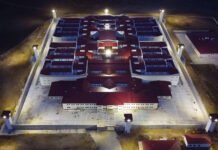Human rights advocates have condemned the inhumane conditions in Turkey’s Y-type high-security prisons — often referred to as “pit-type” prisons— urging authorities to implement urgent reforms.
Turkey categorizes its prisons using different letters (F-type, T-type, L-type, etc.), each representing a different design, security level and inmate capacity. Y-type prisons were first opened in 2021 and are a type of high security prison that is often used for political prisoners, terrorism -related convicts or high-risk criminals. There are currently 12 of these prisons across the country.
These prisons have faced repeated criticism for enforcing solitary confinement, limiting social interaction and severely restricting yard time, sports and other recreational activities.
Lawyer Barkın Timtik in an opinion piece said inmates “barely saw the sky” in Y-type prisons.
“These inhumane places have nothing to do with rehabilitating crime. They seem to be built purely for destruction [of inmates’ mental health]. These facilities are three stories high, with wire mesh on the windows as dense as a sand sieve. Even fresh air is deliberately blocked. When it rains, you can’t even stretch out your arm to feel a single drop. The sky is never visible, especially if you’re in the lower cells. They are built in a way that sunlight never enters.”
He explained that Y-type prisons were worse than any other type of maximum-security prison. “At least in other prisons inmates have some kind of human contact by way of interacting with guards and cellmates,” he said. “In Y-type prisons, everything is electronically managed. The doors open through remote control and the guards talk through speakers. Except for an hour of yard time a day, inmates have no human contact.”
Last year, the opposition Peoples’ Equality and Democracy Party (DEM) released a damning report that not only confirmed previous criticism but also revealed that these prisons were severely overcrowded. Inmates who objected to these conditions were disciplined. Moreover, inmates in other prisons in the country who protested poor conditions were transferred to these prisons as a form of punishment.
“Sultan Acar, the mother of inmate Cebrail Acar, recalled visiting her son and finding him wearing a heavy sweater in the middle of summer. That’s when I discovered their cells were freezing cold because they received no sunlight,’ she said. ‘The prison was designed so that no light could enter the cells. I also learned they weren’t allowed any recreational activities and spent the entire day locked in their cells. My son told me he would leave the prison either critically ill or already dead.”
DEM Party lawmaker Ömer Faruk Gergerlioğlu stated that they had repeatedly appealed to the Ministry of Justice, saying that holding people in these prisons was both inhumane and unlawful, yet had received no response.
“Inmates are not even allowed to sleep in peace,” he said. “The lights are turned on three times during the night to check on the inmates. When we asked the guards about this practice, they told us it was to make sure nobody had died [or killed themselves]. This is unbelievable and just cruel.”
The prisoners are watched by cameras round the clock, even when they are sleeping and using the bathrooms. According to the media mental illness is common among the inmates, with cases of suicide reported.
In protest of the conditions, nine inmates in these prisons launched a hunger strike that is currently nearing 200 days.
Gergerlioğlu said the families of these inmates were distressed since the strikers had drastically lost weight and they were in poor health.
Opposition lawmakers and activists have called on Turkish authorities to close Y-type prisons.












